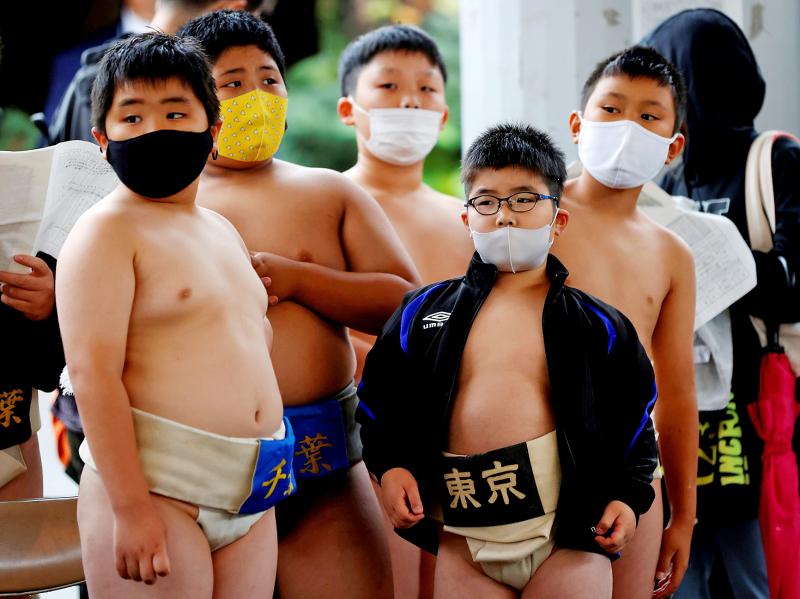Almost overnight, Japan has become a stunning, and somewhat mysterious, COVID-19 success story.
New daily cases of COVID-19 have sunk from a mid-August peak of nearly 6,000 in Tokyo, with caseloads in the densely populated capital now routinely below 100 — an 11-month low.
The bars are packed, the trains are crowded and the mood is celebratory, despite a general bafflement over what is behind the sharp drop.

Photo: Reuters
Japan, unlike other places in Europe and Asia, has not had anything like a lockdown, just a series of states of emergency.
Some possible factors in Japan’s success are a belated but rapid vaccination effort; an emptying out of many nightlife areas as fears spread during a recent surge in cases; a widespread practice, well before the pandemic, of wearing masks; and bad weather in late August that kept people at home.
However, with vaccine efficacy gradually waning and winter approaching, experts have said that without knowing why cases have dropped so drastically, Japan could face another wave like this summer, when hospitals overflowed with serious cases and deaths soared — although the numbers were lower than pre-vaccination levels.
Many credit the vaccination campaign, especially among younger people, for bringing infections down. Nearly 70 percent of the population is fully vaccinated.
“Rapid and intensive vaccinations in Japan among those younger than 64 might have created a temporary condition similar to herd-immunity,” Toho University virology professor Kazuhiro Tateda said.
Vaccination rates surged in July to last month, just as the more infectious Delta variant of SARS-CoV-2 was rapidly spreading, Tateda said.
However, breakthrough infections in the US, Britain and other places where inoculations began months earlier than in Japan show that vaccines alone are not perfect, and that efficacy gradually wears off, Tateda added.
Japan’s vaccinations started in mid-February, with health workers and older people first in line. Shortages of imported vaccines kept progress slow until late May, when the supply stabilized and daily inoculation targets were raised to more than 1 million doses to maximize protection before the Tokyo Summer Olympics.
The number of daily shots rose to about 1.5 million in July, pushing up vaccination rates from 15 percent in early July to 65 percent by early this month, exceeding the 57 percent of the US.
New infections surged just weeks ahead of the Olympic Games, forcing Japan to hold the event with daily caseloads of more than 5,000 in Tokyo and about 20,000 nationwide in early August.
On Sunday, Tokyo reported 40 new cases, below 100 for the ninth straight day and the lowest this year.
People are still wondering about the reason for the decline in cases.
“It’s a tough question, and we have to consider the effect of the vaccination progress, which is extremely big,” Japanese Disease Control and Prevention Center Director Norio Ohmagari said. “At the same time, people who gather in high-risk environments may have been infected and acquired immunity.”
Although some have speculated that the drop in cases might be due to less testing, data released by the Tokyo City Government showed that the positivity rate fell from 25 percent in late August to 1 percent in the middle of this month, while the number of tests fell by one-third.
Tokyo Medical Association deputy head Masataka Inokuchi said falling positivity rates show that infections have slowed.

Four people jailed in the landmark Hong Kong national security trial of "47 democrats" accused of conspiracy to commit subversion were freed today after more than four years behind bars, the second group to be released in a month. Among those freed was long-time political and LGBTQ activist Jimmy Sham (岑子杰), who also led one of Hong Kong’s largest pro-democracy groups, the Civil Human Rights Front, which disbanded in 2021. "Let me spend some time with my family," Sham said after arriving at his home in the Kowloon district of Jordan. "I don’t know how to plan ahead because, to me, it feels

The collapse of the Swiss Birch glacier serves as a chilling warning of the escalating dangers faced by communities worldwide living under the shadow of fragile ice, particularly in Asia, experts said. Footage of the collapse on Wednesday showed a huge cloud of ice and rubble hurtling down the mountainside into the hamlet of Blatten. Swiss Development Cooperation disaster risk reduction adviser Ali Neumann said that while the role of climate change in the case of Blatten “still needs to be investigated,” the wider impacts were clear on the cryosphere — the part of the world covered by frozen water. “Climate change and

Poland is set to hold a presidential runoff election today between two candidates offering starkly different visions for the country’s future. The winner would succeed Polish President Andrzej Duda, a conservative who is finishing his second and final term. The outcome would determine whether Poland embraces a nationalist populist trajectory or pivots more fully toward liberal, pro-European policies. An exit poll by Ipsos would be released when polls close today at 9pm local time, with a margin of error of plus or minus 2 percentage points. Final results are expected tomorrow. Whoever wins can be expected to either help or hinder the

DENIAL: Musk said that the ‘New York Times was lying their ass off,’ after it reported he used so much drugs that he developed bladder problems Elon Musk on Saturday denied a report that he used ketamine and other drugs extensively last year on the US presidential campaign trail. The New York Times on Friday reported that the billionaire adviser to US President Donald Trump used so much ketamine, a powerful anesthetic, that he developed bladder problems. The newspaper said the world’s richest person also took ecstasy and mushrooms, and traveled with a pill box last year, adding that it was not known whether Musk also took drugs while heading the so-called US Department of Government Efficiency (DOGE) after Trump took power in January. In a